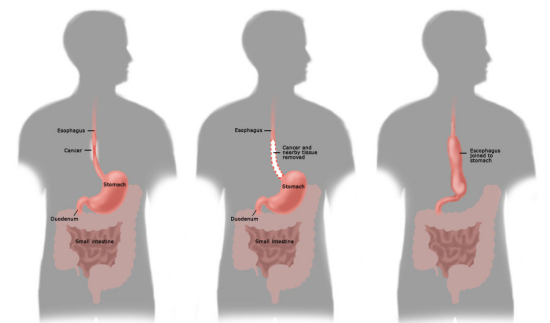Institute Of
Gastroenterology
Home » The Institute of Gastroenterology, Hepatobiliary Science & Transplantation » Surgical Gastroenterology » Esophageal Surgery
Esophageal Surgery
Surgery of the esophagus is conducted for perforation, cancer, reflux and other conditions.

GERD Esophageal surgical procedures may be carried out for gastroesophageal reflux disease or acid reflux. This is common when the acidic juices in the stomach leak into the esophagus. Surgical intervention tightens and restructures the area using laparoscopy. Several small incisions are made in the abdomen and the upper portion of the stomach is wrapped up at the base of the esophagus.
Surgery for corrosive esophageal Injury: Intentional or unintentional ingestion of corrosive acid or alkali can cause severe damage to the esophagus and or stomach. A good number of these patients respond well to endoscopic dilatation while some of them will require surgery. A transhiatal esophageal resection is to be undergone for corrosive damage. A gastric pull-up or colon pull-up is achieved to replacethe damaged esophagus.
Esophageal Cancer Surgery: Cancer of the esophagus is normally identified in smokers predominantly with dysphagia (inability to swallow) and progressive weight loss. Cancer along with the surrounding normal tissue willbe eliminated surgically. Lower third and middle third cancers of the esophagus are amenable to the surgical procedure in the form of elimination of the esophagus referred to as esophagectomy. Esophagectomy is of two types they are, open esophagectomy and minimally invasive esophagectomy.
- Open esophagectomy may be approached as transthoracic esophagectomy in which, the part of the esophagus is eliminated through small incisions in the chest and abdomen. It may also be approached as transhiatal esophagectomy where the incisions are made in the abdomen and neck. In fewer to some procedures, incisions are made through all three avenues, the abdomen, chest, and neck.
- Minimally invasive esophagectomy is one of the proceduresthis is performed for small cancers, in which surgical instruments are inserted through small incisions and a scope is inserted to view inside the organs during the operation.
Surgery for cancers of GE junction Cancer of the gastro-esophageal junction calls for the elimination of the esophagus and a part of the stomach. This procedure is known as esophago-gastrectomy. The remains of the stomach are then pulled up through the chest and anastomosed to the esophagus in the neck.
Achalasia cardia – Achalasia cardia is a functional and motor ailment of the esophagus. The lower sphincter of the esophagus fails to loosen up and there may be high body peristalsis. It is a benign situation wherein there could be an obstruction on the lower end of the esophagus more often handled through balloon dilatation. Failure of balloon treatment would require a surgical procedure in the form of Laparoscopic / Open Cardiomyotomy.

